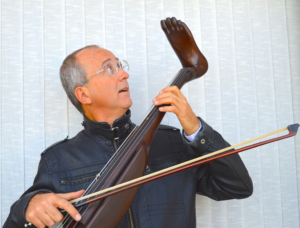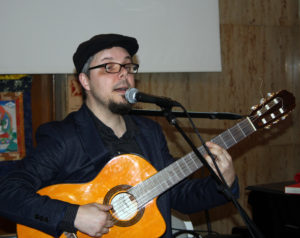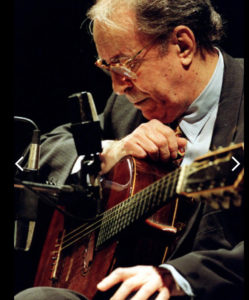Brazilian Bossa Duo
Tribute to João Gilberto2019 Aug 1, Thursday – 7:00-8:30 pm
2019 Aug 2, Friday – 6:00-10:00 pm
2019 Aug 3, Satuarday – 7:30-8:30 pm
UrbanBeat
Brazilian Bossa Duo re-presents bossa nova classics, some conventionally played, and some atypically combined with cello. Dago Schelin, guitar and vocals, currently from Marburg Germany. Péricles Varella Gomes, cello and percussion from Curitiba, Brazil. Both have PhDs and travel the world performing.
ABOUT João Gilberto
João Gilberto, one of the primary creators of bossa nova, the intimate Brazilian music that became a major cultural export, has died. He was 88. His son, João Marcelo Gilberto, confirmed the death on Facebook, although he did not say where or when Gilberto died.
Starting with his 1958 single Chega de Saudade, Gilberto in his late 20s became the quintessential transmitter of the harmonically and rhythmically complex, lyrically nuanced songs of bossa nova (slang for “new thing” or “new style”), written by Antônio Carlos Jobim, João Donato, Vinicius de Moraes and others.
In the music he recorded from 1958 to 1961 – contained on the albums Chega de Saudade, O Amor, O Sorriso e a Flor and Joao Gilberto – Gilberto took strains of Brazilian samba and American pop and jazz and reconfigured them for a new class of young Brazilian city-dwellers, helping to turn bossa nova into a global symbol of a young and confident Brazil.
His new synthesis replaced samba percussion with guitar-picking figures in offbeat patterns (called by some “violão gago,” or “stammering guitar”) and conveyed interiority through a singing style that was confiding, subtly percussive and without vibrato.
“When I sing, I think of a clear, open space, and I’m going to play sound in it,” Gilberto said in an interview with New York Times jazz critic John S Wilson in 1968. “It is as if I’m writing on a blank piece of paper. It has to be very quiet for me to produce the sounds I’m thinking of.”
Reclusive
Gilberto was not much of a songwriter: He was both “less and more than a composer,” as the Brazilian singer and songwriter Caetano Veloso, one of his admirers, once put it. He was reclusive, rarely forthcoming with the news media and his audiences, and sometimes truculent onstage if his demands about sound were not met. But his work became a sign of the relative prosperity, optimism and romance of Brazil during the period of Juscelino Kubitschek’s presidency in the late 1950s, and an ideal of musical restraint and mystery thereafter.
(Source: Pericles Varella Gomes, PhD. Curitiba, Brazil)
Interview (in Spanish): https://youtu.be/56QrXrRnDsY
ABOUT Dago Schelin
Brazilian Dago Schelin has been living in Germany where he has become known for brazilianizing age-old German folksongs. Johann Wolfgang von Goethe’s 1771 poem Heidenröslein (Little Rose of the Field), which Franz Schubert turned into music in 1815, is reinterpreted by Dago in his album Rosas Heft (Rosa’s notebook) as a gentle baião, a typical musica popular genre of Brazil’s northeast. German press have said Guten Abend, Gute Nacht sounds as though Brahms composed it on Copacabana[1]. Rosas Heft refers to Dago’s great-grandmother Rosa Hetzel who emigrated from Leipzig to the south of Brazil in 1911. In a 1931 handwritten notebook, Rosa had preserved poems and song lyrics that Dago has rediscovered, reinterpreted and re-gifted back to those who might have forgotten their Volkslieder. But mostly Dago says his two small children love the songs.
While he is rediscovering his family roots in Germany, Dago’s passion is the good old Brazilian bossa nova classics, from Tom Jobim to Caetano Veloso. With a soothing voice and an authentically Brazilian guitar style, Dago Schelin welcomes listeners to re-experience known songs and to try out some alternative musical ideas, such as Beatles, but again, rearranged. Dago Schelin’s Living Room is the name of this album.
Dago got his bachelor degree in Música Popular at the Faculdade de Artes do Paraná, Brazil. Interestingly, Dago lived in East Lansing for two years when he was a child. His father had gotten a postdoc scholarship at the Cyclotron. Now, 30 years later, Dago is back!
ABOUT Pericles Gomes
Academic Activities: Bachelors degrees in Visual Arts and Music from the School of Music and Fine Arts of Paraná (1982); Architecture and Urbanism from the Federal University of Paraná (1982), Masters in Telecommunication: Michigan State University (1990) and Ph.D. in Educational Systems Development – Michigan State University (1996). He is currently professor at Universidade Positivo.
Artistic activities: Cellist. Participated in presentations in Europe, the United States and Brazil. He began his musical studies at the age of 6 (piano); but decided to play the cello (at age 10); percussion at age 16. Electronic music at age 26. He has performed or performed in hundreds of orchestral, chamber, jazz and Samba presentations, among which: First Cellist and founder of the Parana Symphony Orchestra (Guaira Theater); Bahia Symphonic Orchestra (Castro Alves Theater); Chamber Orchestra of Blumenau (Carlos Gomes Theater); Orquesta de Joinville (Teatro Harmonia Lira); Jaraguá do Sul Philharmonic Orchestra (SCAR Theater); Michigan State University (1987 to 1996) Symphony Orchestra; Midland Symphony, Battle Creek Symphony, Jackson Symphony, Lansing Symphony, Bolshoi Theater School of Brazil (Joinville), Trio Ravello (Italy), Bolshoi Theater (Moscow) among other presentations.






